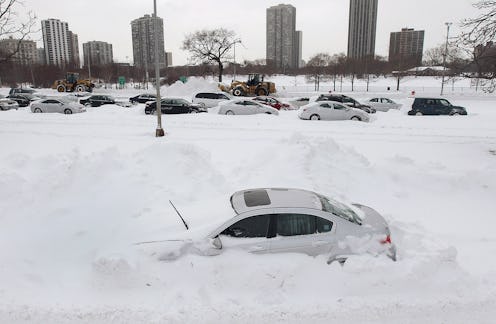News
Midwesterners Think East Coast Snow Panic Is Cute
Yesterday's media was overflowing with blizzard-related news. There was really no escaping it. If you pulled up a fashion blog, you were inundated with arctic style options to stay fashionable in a blizzard; if you opted to check out something to listen to, you'd have found yourself the audience for "Best Podcasts For The Blizzard". Sports fans were treated to lists breaking down the top "snow sports moments," Conservatives used the news to push anti-environmentalist messages (because, as we all know, every cold day is further proof that global warming isn't real!), and, well, you get the point. It was everywhere; it was inescapable regardless of where in the country you resided.
Being from Chicago, I've seen my fair share of inclement weather. What I haven't seen is the Hollywood-style doom-saying from national news outlets. CNN has never warned me to take cover and say my prayers and hope for survival from the big, bad, menacing snowflakes. The AP has never told me that my fair city would be wiped from the map. Part of me feels like I'm missing out on the top-notch theatrics the east coast gets in the lead-up to big storms. The other part of me — the part that is prone to being plagued by intense bouts with anxiety—is 100 percent content with not having to fear that apocalypse is just around the barometric corner.
Still, it's really interesting to look at how national media outlets cover events happening on the east coast, in comparison to how they talk about (and the degree to which they talk about) events happening elsewhere in the country. There's no question about it: There's a big difference in how east coast storms are talked about compared to storms in the Midwest, both from the people who live there and the media outlets who report on them.
It's easy to brush off warnings of "record-setting" snowfall as just the media trying to hype a story, but maybe this was different? I mean, look at these tweets:
"Extreme?" "State of emergency?" Mandatory road closings? Maybe this is a big deal.
Nah.
Listen to enough sports radio, and you're certain to hear the term "east coast bias" tossed around from time to time. Essentially, "east coast bias" refers to the idea that sports media is predisposed to treat large market, east coast teams with more importance than their Midwestern counterparts. Why is it that the oft-pathetic New York football teams get so much airtime on large-scale sports programs? This football season, the Detroit Lions won 11 games, which is one more than the Giants and Jets combined, but you wouldn't know if from the disproportionate mainstream sports media coverage granted to each team. That's what people mean by "east coast bias"—and it applies outside of the sporting world, too.
This bias exists for two reasons. For one, a huge cluster of national news media is based out of New York ("Yay, go local sports team!"). Second, the east coast is home to a relatively massive volume of people (i.e., viewers and consumers). Tailoring national coverage to appeal to them simply makes economic sense. Now, there are a number of ways to fight east coast bias. One is to rant and rave about the existence of such bias. Another, far more more entertaining route is to engage in snark, superiority, and schadenfreude.
One of my favorite activities during these types of media-hyped storms, is to look to people from other blizzard-prone parts of the country. Because here's the real truth: The kind of headline-making, city-stopping, panic-inducing winter storms that occasionally pepper the lives of Northeasterners are just a part of most Midwesterners' lives. It's not news — it's our reality.
This means, when something like last night's Winter Storm Juno pops up, and the ensuing media frenzy and panic among the inhabitants of threatened cities, we Midwesterners respond with a combination of bemused condescension ("Poor babies are scared of a little snow!") and tired indignation. Because, once again, the nation is being asked to pause and wring its hands over the fate of the media's darling corner of the country.
But at least we can be satiated with hilarious tweets. At least there's that:
Not even the Chicago Tribune editorial board could resist engaging in some snarky concern-trolling.
Now, to be clear, blizzards can be the dangerous, deadly monstrosities the media makes them out to be. For example:
It's just a bit rare.
Four years ago, Chicago was hit with a massive blizzard that led hundreds of stranded drivers on Lake Shore Drive to just up and abandon their cars, creating a very Walking Dead-like scene (but, you know, with snow instead of zombies).
Lake Shore Drive, Chicago, 2011
The saving grace of that blizzard was that it produced some of the funniest, most biting satire ever to make its way to Twitter. By that, of course, I'm talking about Dan Sinker's extremely NSFW @MayorEmanuel Twitter account, which detailed the fictional tale of mayoral candidate Rahm Emanuel, advisor David Axelrod, pet duck Quaxelrod, and Carl the intern, as they navigated the Hoth-like Chicago landscape.
While the "record-setting" blizzard of 2015 may have been an overblown bust, it made for great ratings, right?
Images: Getty Images(2)
